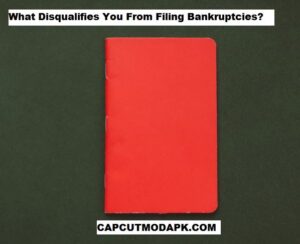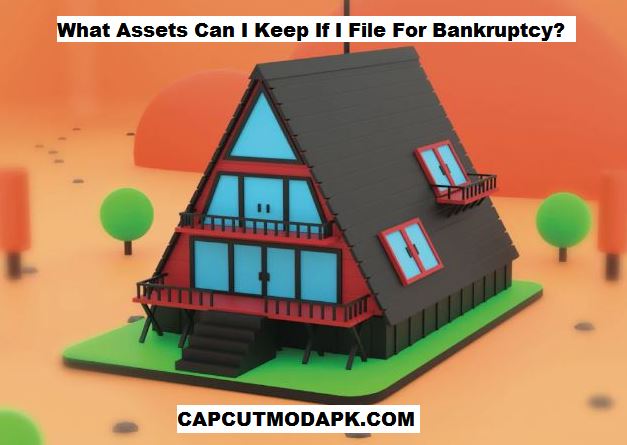Filing for bankruptcy is a serious financial decision that can have lasting effects on your personal and financial life. However, one of the biggest concerns for people facing bankruptcy is the fear of losing everything they own. If you’re wondering what assets can I keep if I file for bankruptcy, the answer depends on various factors, including the type of bankruptcy you file, the state you live in, and your specific situation. Understanding your rights and what assets are protected can provide some relief during a challenging time.
When you file for bankruptcy, your debts are either reorganized or discharged, depending on the chapter you choose. The idea behind bankruptcy is to provide you with a fresh start, but it doesn’t necessarily mean that you will lose all of your property. Many assets, such as basic household items, vehicles, and tools needed for your livelihood, may be protected under bankruptcy exemptions. Knowing which assets you can keep is key to navigating the bankruptcy process with confidence.
In this article, we will discuss what assets can I keep if I file for bankruptcy, the types of bankruptcy available, and the exemptions that may apply to your situation. We will also cover important topics like disqualifications for filing bankruptcy, the amount of debt required for Chapter 7, and what to expect after filing for bankruptcy.
Also, READ
How To File For Bankruptcy As A Small Business Owner
What Is The Difference Between Chapter 7 And Chapter 13 Bankruptcy?
Assets I Can Keep If I File For Bankruptcy
One of the main concerns when filing for bankruptcy is whether you will be able to keep your personal property. The good news is that bankruptcy exemptions allow you to protect certain assets, ensuring that you do not lose everything in the process. However, the types of assets you can keep vary depending on the chapter of bankruptcy you file, your state’s exemption laws, and your particular financial situation.
Exemptions in Chapter 7 Bankruptcy
If you file for Chapter 7 bankruptcy, which is often called “liquidation” bankruptcy, the bankruptcy court will sell off your non-exempt assets to pay back creditors. However, you are allowed to keep certain assets that are deemed exempt by law. Exemptions typically include things like your primary residence (up to a certain value), personal items like clothing, household goods, and even a vehicle, depending on the value.
Each state has its own set of exemptions, and some states allow you to choose between state and federal exemptions. For example, federal exemptions may protect up to $25,150 of equity in your home, while state laws may provide more generous protection. If the value of your property exceeds the exemption limits, the trustee may sell your non-exempt assets to pay creditors. But in many cases, people filing for Chapter 7 bankruptcy are able to keep most of their personal property.
Exemptions in Chapter 13 Bankruptcy
Chapter 13 bankruptcy, known as “reorganization” bankruptcy, allows you to keep your property while you repay your debts over a 3- to 5-year period. Since you do not liquidate assets in Chapter 13, the issue of exempt assets is less of a concern. The goal of Chapter 13 is to restructure your debt to make it more manageable, which can allow you to keep assets that may have been at risk in Chapter 7.
In Chapter 13, the bankruptcy court will require a repayment plan that involves paying back a portion of your debts over time. Your ability to keep your assets depends on the value of those assets and your repayment plan. However, the protection of assets such as your home, car, and personal belongings is typically greater under Chapter 13 than in Chapter 7, as long as you follow the repayment plan and keep up with your obligations.
Homestead Exemption and Other Property
Many states offer a homestead exemption, which protects the equity in your primary residence up to a certain limit. If you are concerned about keeping your home, understanding your state’s homestead exemption laws is important. Some states offer unlimited homestead exemptions, meaning you can keep your home regardless of its value, while others limit the amount of equity you can protect.
Additionally, other assets, such as retirement accounts, tools of trade, and life insurance policies, are often exempt from bankruptcy proceedings. These exemptions can vary from state to state, so it’s crucial to consult a bankruptcy attorney to understand the specific exemptions available in your jurisdiction.
What Disqualifies You From Filing Bankruptcies?

Filing for bankruptcy may seem like an easy way out of financial difficulties, but there are certain disqualifications that prevent individuals from being eligible to file. Understanding what disqualifies you from filing bankruptcies is essential if you are considering bankruptcy as an option.
Previous Bankruptcy Filings
One of the key disqualifications is the timing of any previous bankruptcy filings. If you’ve filed for bankruptcy in the past, there are time restrictions that prevent you from filing again too soon. For instance, if you previously filed for Chapter 7 bankruptcy, you may have to wait eight years before filing again. If you filed for Chapter 13 bankruptcy, the waiting period is typically two years before you can file for Chapter 7 again.
These waiting periods exist to prevent people from repeatedly using bankruptcy as a tool to avoid paying debts without making an effort to improve their financial situation.
Income and Means Test
Another factor that can disqualify you from filing for bankruptcy is failing the means test. The means test determines if your income is too high to file for Chapter 7 bankruptcy. If your income exceeds a certain threshold based on the median income in your state, you may not be eligible to file for Chapter 7. In this case, you may still be able to file for Chapter 13 bankruptcy, where you will be required to repay a portion of your debts over time.
The means test looks at your income, family size, and expenses to determine your eligibility for Chapter 7. If you pass the test, you may proceed with Chapter 7; if you fail, you may be required to file for Chapter 13.
Fraudulent Behavior and Misrepresentation
If you have engaged in fraudulent behavior, such as hiding assets or providing false information during your bankruptcy proceedings, you may be disqualified from filing. Bankruptcy courts take fraud very seriously and will deny bankruptcy petitions if they believe there is intentional misrepresentation. It’s important to be honest and transparent throughout the bankruptcy process.
How Much Do You Have to Be in Debt to File Chapter 7?
If you’re considering filing for Chapter 7 bankruptcy, you may be wondering how much do you have to be in debt to file Chapter 7? The short answer is there is no minimum debt requirement to file Chapter 7. However, the amount of debt you owe can influence the decision-making process and the eligibility criteria for filing.
Means Test and Debt Thresholds
Although there’s no specific minimum debt requirement for Chapter 7 bankruptcy, your income and debt levels are important factors. If your income is too high to qualify for Chapter 7 based on the means test, you may be required to file for Chapter 13 bankruptcy instead. For many people, the amount of debt they have isn’t the deciding factor; it’s their ability to repay those debts.
In Chapter 7, your assets are liquidated to pay off creditors, and any remaining unsecured debt, such as credit card balances and medical bills, is typically discharged. However, your income, not just the total amount of debt, determines whether Chapter 7 is appropriate for your situation.
The Role of Secured and Unsecured Debt
Chapter 7 bankruptcy works best for people who have significant unsecured debt that they cannot pay back. Unsecured debts include credit card debt, personal loans, and medical bills. If most of your debt is secured by collateral (such as mortgages or car loans), Chapter 7 may not discharge these debts, and you may need to consider Chapter 13 bankruptcy for a more manageable repayment plan.
What Can You Not Do After Filing Bankruptcies?
After you file for bankruptcy, there are certain restrictions on what you can do. These restrictions are designed to help you stay on track with your repayment plan and protect your creditors. Understanding what you cannot do after filing bankruptcies will help you avoid potential mistakes that could derail the process.
Taking On New Debt
Once you file for bankruptcy, you are typically not allowed to take on new unsecured debt without approval from the bankruptcy court. This means that you cannot simply rack up new credit card bills or take out personal loans. Doing so could result in your bankruptcy discharge being revoked, and your case could be dismissed.
Selling or Hiding Assets
After filing for bankruptcy, it is illegal to hide assets or attempt to transfer property to others in order to keep it out of the bankruptcy proceedings. Doing so can result in criminal charges and the loss of any exemptions that would otherwise apply to your property. It’s important to follow the rules and be transparent about your assets.
Modifying Your Bankruptcy Plan
In Chapter 13 bankruptcy, you are required to follow a repayment plan over 3 to 5 years. During this time, you cannot modify the plan on your own without court approval. If your financial situation changes during this period, you may be able to request a modification to your repayment terms, but this must be done through the court.
Chapter 13 Bankruptcy
Chapter 13 bankruptcy is a popular option for individuals who want to reorganize their debt while keeping their assets. Unlike Chapter 7, which involves liquidating assets, Chapter 13 allows you to keep your property and pay back a portion of your debt through a 3- to 5-year repayment plan.
In Chapter 13 bankruptcy, you do not lose your assets unless you default on the repayment plan. The plan is tailored to your ability to pay, and unsecured debt is often reduced or eliminated at the end of the repayment period. Chapter 13 is an ideal option for people who want to avoid losing their home or car and need time to catch up on past-due payments.
3 Types of Bankruptcies
There are three main types of bankruptcy: Chapter 7, Chapter 11, and Chapter 13. Each one serves a different purpose, and the choice depends on your financial situation and goals.
- Chapter 7: Liquidates assets to discharge unsecured debt. Best for individuals with few assets and a lot of unsecured debt.
- Chapter 11: Typically used by businesses, Chapter 11 allows for reorganization of debts while continuing operations.
- Chapter 13: Reorganizes debt and allows for repayment over a period of 3 to 5 years, ideal for individuals who want to keep their property.
Chapter 11 Bankruptcy
Chapter 11 bankruptcy is often used by businesses but can also apply to individuals with substantial debts. It involves reorganizing debt and creating a repayment plan. This type of bankruptcy allows the filer to keep their assets while restructuring the business or individual finances.
How to File Chapter 7 With No Money
If you are considering Chapter 7 bankruptcy but have no money to pay for the filing fees or attorney costs, there are options available. Some courts allow you to file a fee waiver if your income is below a certain threshold. You can also seek out legal aid services or pro bono bankruptcy lawyers who may assist you at no charge.
Conclusion
When it comes to what assets can I keep if I file for bankruptcy, understanding the exemptions and rules that apply to your situation is essential. While bankruptcy can be overwhelming, the process can give you a fresh start while still allowing you to keep essential assets. Whether you file for Chapter 7 or Chapter 13 bankruptcy, knowing your rights and the protections available will help you make informed decisions and move forward with confidence.


